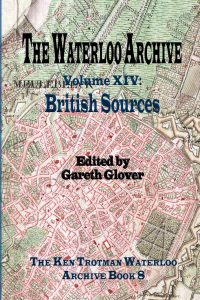
The Waterloo Archive Volume XIII British Sources
Published by Ken Trotman Publishing
April 2021
I am sure that many who have followed this series are amazed that there
is still more Waterloo material to be found and published; and I can assure
you that I am no less surprised than they are. Every time I believe that I
am close to the end, a new avenue of exploration opens up and more is
inevitably found. I am already certain that this will not be the final volume
of the Waterloo Archive and the search is ongoing for even more.
So what delights are there to be found in this volume?
Firstly we have letters from another four men from the ranks (Private
James Clark of the 2nd Life Guards, Private Dixon Vallence of the 79th
Foot, Private Mathew Orr of the 92nd Foot and Corporal Andrew Jordan
of the 91st Foot), showing that the level of literacy throughout the army
was higher than previously perceived and indeed some, such as Private
Mathew Orr show a high level of education.
Also included is a very interesting journal from Second Captain Edmund
Walcott of the Royal Horse Artillery, letters from Lt Colonel William
Gomm and Captain Henry Macleod, both on the Staff of the Quarter
Master General. There is also a very interesting letter by Captain William
Tyrwhitt Drake of the Horse Guards in defence of his reputation, his head
wound not being physically apparent having led to rumours of cowardice.
The letters of Lieutenant James Crummer 28th Foot are interesting as are
a series of letters to and from Sir Andrew Barnard 95th Foot whilst acting
as governor of an Arrondissement in Paris. Lieutenant Charles Holman’s
diary, the only contemporary account by a 52nd man is also of great interest.
Sir Robert Grant’s list of senior surgeons attached to each division is also
invaluable.
Finally I include a number of fascinating and informative accounts from
people who were not actually personally involved in the campaign, one is
a statement of what happened to Juanita Smith, wife of Harry Smith of
the 95th during the campaign and the records of a visit to the battlefield
and Paris only one month after operations had ceased by the Honourable
Thomas Kenyon.
